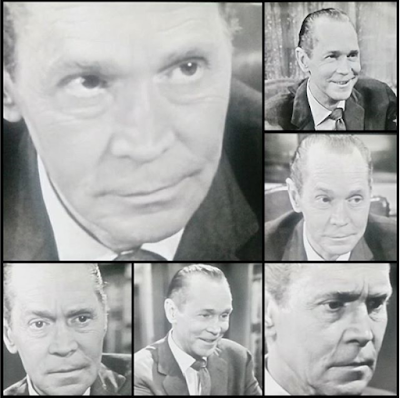Franchot starred as Frank James, the brother of outlaw Jesse James in Bitter Heritage, a 1958 television production featuring a young Elizabeth Montgomery. Airing on August 7, 1958, Bitter Heritage was a 90 minute western drama focused on Jesse James, Jr. coming to terms with his family's notorious legacy. Warning: there are plot spoilers in this summary.
Jesse Jr. (James Drury) has nightmares about his father's death. He has been raised by his uncle Frank James (Franchot Tone), a man who has desperately tried to escape his former life of crime by living far away from the James homestead. Frank hasn't been home in 15 years, but there's good land there and a brood mare sale that lands him back in Kearney. (There's a funny scene in which Jr. asks his uncle if he remembered to bring money. Franchot, as Frank, grabs his belly—he's hidden the money under his shirt—shakes it, and smirks, "That's not belly fat, boy!")
As they ride closer and the town comes into view, Jesse Jr. asks his uncle what he sees. Frank replies:
Ghosts!...Some things you can't forget. People don't letcha...things don't change if people stay the same.
Jesse Jr. thinks that his uncle and grandmother (Eva Le Gallienne) are living in the past and making too big a deal of the events that transpired here before. He's optimistic and naïve and fails to face who his father really was. As Frank says over breakfast with his mother:
We lived those times. We understand them. He don't.
Although fifteen years have passed, Frank's instantly recognized in town. Colonel Brecker sees Frank checking in at the hotel and refuses to shake his hand. The colonel's young and fearless daughter Mary (Elizabeth Montgomery) invites Frank and Jesse Jr. to a party at their house while the colonel complains to the town sheriff about their presence.
Frank is already doubting his decision to come back to Kearney under any circumstances when old gangmates spot him. Luke (Robert Middleton) has been waiting to kill Frank James ever since Frank ran out and Luke narrowly escaped death at a hanging. Now, Luke assumes that Frank is back to step on Luke's toes and start trouble. Luke and his pals bombard Frank's hotel room, punch and threaten him.
Frank wants to leave immediately. He says that he's been tried and acquitted twice cause no witnesses ever came forward, and he doesn't plan on causing a stir now. Jesse Jr. thinks Frank's a coward. Frank responds:
There's a difference between running and stepping outta something you've got no control over.
We learn that when Jesse Jr. was a boy, Frank saved him from being a sideshow attraction. Frank rescued him and gave him a normal life. He doesn't want it ruined now.
Jesse Jr. refuses to leave. He's smitten with Mary and plans to attend her party. Frank becomes drunk at the bar and is telling lively stories. Luke's posse comes in, bully Frank, introduce a mentally ill homeless man who claims he is the real Jesse James, and taunt Frank by singing a song about his brother.
Frank is beaten by the men outside of the bar and his gun is stolen from him on the first night he's carried it in 15 years.
Frank recovers at the James homestead and Grandma criticizes Jesse Jr. for attending the Brecker party and says that Jesse Jr. is denying his birthright.
While Frank and Jesse are at home, masked men calling themselves Frank and Jesse rob the local bank. They kill the banker and leave behind a gun marked with the initials FJ. Mary is in the bank when it happens and swears that it wasn't Frank and Jesse. But the townspeople are eager to persecute the James family and a posse rides out to impose their own justice.

Grandma walks out front with a gun while Frank abandons the house from the backdoor. Jesse Jr. (and some viewers) assume Frank, desperate to escape the past, is running out. In truth, Frank gets on a horse and purposely leads the posse away to protect Grandma and Jesse Jr. As the men chase Frank, Jesse Jr. rides to the sheriff and asserts himself. With a loaded gun, Jesse Jr. threatens to shoot if he is not heard. The mentally ill man who believes he is the original Jesse James tells Jesse Jr. that the bank robbers are in a cave. The posse (with Frank) and Jesse Jr. ride to the cave to discover Luke and his gang hiding inside with the stolen money. Finally, Frank and Jesse Jr. are vindicated and welcomed back to their home.

Bitter Heritage is an engrossing tale of embracing the future while never forgetting the past. The telefilm is full of accomplished actors providing meaningful performances. Franchot is touching as the ex-outlaw eager to live a regular life away from scandal. Franchot starred in a handful of western roles in television and he seems right at home in that genre. It's a wonder that Franchot never starred in a western film after the 1940 western-comedy Trail of the Vigilantes. He was able to easily embody the good guy, bad guy, and especially, the man in-between in his western characters.












